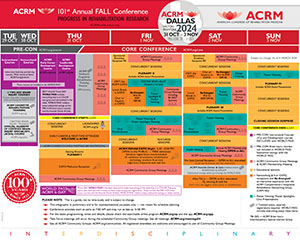Not registered yet? Register and SAVE 20% use code "finaldays20" at checkout. DETAILS: ACRM.org/finaldays20
QUESTIONS? --> meetings@ACRM.org
Symposium
Big Data
Technology
Lying by Telling the Truth: How Data Can Be Manipulated to Support and Propagate Fallacies and Falsehoods in Healthcare 6867
Thursday, October 31, 2024
2:30 PM - 3:30 PM
Location: ROOM: Rosetta REGION: Atrium II Mezzanine Level >>> DIRECTIONS: Exit Atrium Elevators. Take a right and proceed down the corridor. Continue past the escalators and the row of rooms on your left. At the end of the row of rooms, turn down the corridor on the right. Rosetta is the last room on the left. If coming from the Tower Mezzanine, from the Tower Elevators, turn right. Proceed down the stairs and take the first corridor on your left. Rosetta is the last room on the left.

Grayson Stephen Chao, PT,DPT, OCS,CSCS (he/him/his)
Manager
New York University
New York, New York, United States
Jennifer Shin (she/her/hers)
Associated Faculty
New York University
New York, New York, United States
Presenter(s)
In recent years, Physical Medicine and Rehabilitation fields have evolved to incorporate more data and advanced analytics into clinical practice and decision making. To audiences who are not deeply literate in data analytics, it may be difficult to parse out if the presented data is incorrect, explicitly being misrepresented or correct data which has errors in its presentation. This lecture seeks to build foundational data literacy in a healthcare audience to be able to discern these data issues and avoid practicing in ways unsupported by data. Additionally, integrating data into clinical practice can be difficult if presented with assertions of data through informal logical fallacies. A second goal of this lecture is to explore the world of informal logical fallacies in the healthcare space through common logical fallacies deployed in the discussion of practice evidence. The audience will also be given strategies to identify and rebut such fallacious arguments.


Learning Objectives:
- Upon completion, participants will be able to define Big data
- Upon completion, participants will be able to define and describe the use of modern data analytic techniques in current healthcare landscape
- Upon completion, participants will be able to recognize the analytical and methodological errors that may lead to incorrect representation of accurate data
- Upon completion, participants will be able to define and describe data driven logical fallacies
- Upon completion, participants will be able to understand how logically fallacious arguments based on data present in clinical practice
- Upon completion, participants will be able to define Big data
Disclosure(s):
Grayson Stephen Chao, PT,DPT, OCS,CSCS: No financial relationships to disclose
Jennifer Shin: No financial relationships to disclose

.jpg)
.jpg)
.jpg)
